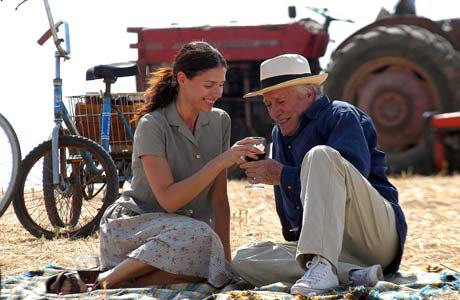If youre thinking of joining a kibbutz, you might want to think twice, especially after seeing this lacerating Israeli feature on the subject.
Set in 1974, Sweet Mud deals with the trials of 12-year-old Dviri and his mentally unstable mother Miri, the latter of whom is especially persecuted by the uptight, self-righteous, rule-crazy jerks who govern the collective and are intolerant of her fragile condition. When her older Swiss boyfriend shows up for a visit, the group immediately closes ranks to reject him; this has the effect of turning Dviri against the people who conspire to destroy his mothers life.
Writer/director Dror Shaul spares no one in his debunking of the whole kibbutz ethos. Maternal issues aside, the bullying the children receive during their bar mitzvahs and the residents tendency towards smug brutality will have you clutching at your theatre seat and cursing the beleaguered protagonists tormentors. And as they close ranks around poor Miri, its not hard to see a self-fulfilling prophecy in the diagnoses of her deteriorating mental state.
Still, its not exactly a strident film: the tenderness with which Dviri and his mother are drawn is extended to the rest of the community, who are given every opportunity to see the light and who, through sheer pig-headedness, refuse to do the sympathetic thing.
The film is rich in character detail (even the villains have their quirks) and is reasonably well shot to boot. The effect is a quiet evocation of a devastating experience, controlled in its drama but extremely powerful in practice. It had me riveted from beginning to end and I cant recommend it more highly.
(Mongrel Media)Set in 1974, Sweet Mud deals with the trials of 12-year-old Dviri and his mentally unstable mother Miri, the latter of whom is especially persecuted by the uptight, self-righteous, rule-crazy jerks who govern the collective and are intolerant of her fragile condition. When her older Swiss boyfriend shows up for a visit, the group immediately closes ranks to reject him; this has the effect of turning Dviri against the people who conspire to destroy his mothers life.
Writer/director Dror Shaul spares no one in his debunking of the whole kibbutz ethos. Maternal issues aside, the bullying the children receive during their bar mitzvahs and the residents tendency towards smug brutality will have you clutching at your theatre seat and cursing the beleaguered protagonists tormentors. And as they close ranks around poor Miri, its not hard to see a self-fulfilling prophecy in the diagnoses of her deteriorating mental state.
Still, its not exactly a strident film: the tenderness with which Dviri and his mother are drawn is extended to the rest of the community, who are given every opportunity to see the light and who, through sheer pig-headedness, refuse to do the sympathetic thing.
The film is rich in character detail (even the villains have their quirks) and is reasonably well shot to boot. The effect is a quiet evocation of a devastating experience, controlled in its drama but extremely powerful in practice. It had me riveted from beginning to end and I cant recommend it more highly.
